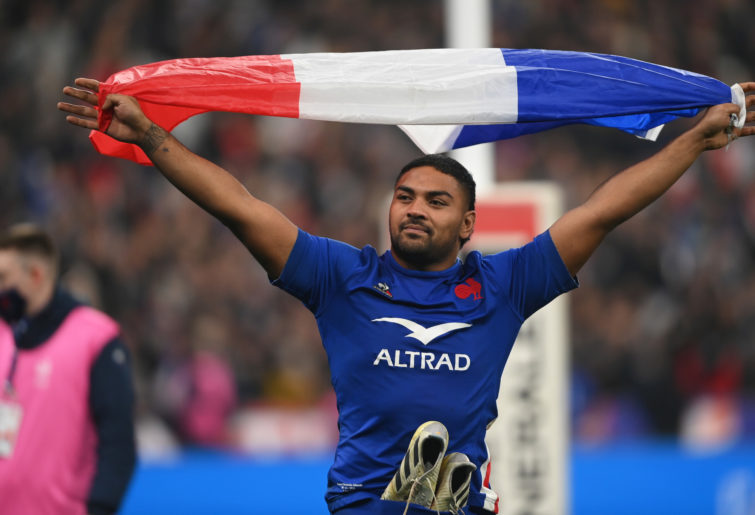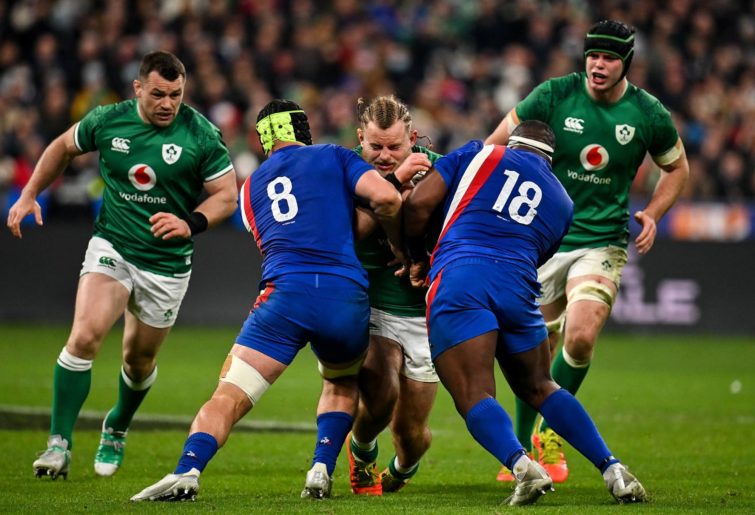France did not come easy or early to rugby union.
In the late 19th century, a French journalist – who must have witnessed a falcon – wrote about ‘le football’ (rugby union) thus: “It is a brutal British game. The ball is a heavy projectile and when propelled by a vigorous English kick is at least as dangerous as the ball of a revolver.”
I wonder what he would have written about the sound of a ball being decimated polewards by Jordie Barrett.
Nevertheless, Frenchmen in the south of France picked up the “gun”. Rather than play it more elegantly, France saw the game as mostly a fracas or a melee. It was not uncommon for teams to fist fight within themselves, or maim ‘le arbitre’.
“Rugby is a quarrel perfectly expressed,” mused novelist Jacques Perret. French rugby has tended to be quarrelsome. Their entire society is perpetually in a state of revolution.

(Photo by Mike Hewitt/Getty Images)
Once, on the same day in Rennes as I attended an arbitration, a strike by lawyers coincided with the escape of monkeys from the zoo.
I was astounded. I did not know lawyers could do that, or that any client or judge would care really, and I was thrilled at the apes’ solidarity with a subspecies only marginally more evolved.
Robed advocates and liberated primates marching for more pay; less work. Just like backs and forwards.
This was the state of French rugby – a mad drunken rooster – until the late ’40s, when out of the ashes of a decadent and failed state, one Jean Prat led them to start to compete fair and square with the Home Nations.
But French rugby considers their birth on the Test scene the year 1958: the first Tricolor tour of Afrique du Sud, to face (and beat) the then almost unbeatable Boks. It was the first visiting team to win a series (one win, one draw) in South Africa in over six decades.
Their training methods were unorthodox: skipper Dr Lucien Mias drank an entire bottle of rum the night before an Ellis Park Test, and then wandered the halls of the Langham Hotel. This is one way to immunise oneself from the likes of Susie Poison.
The French halfback Pierre Danos, shaped like a gymnast, was the player of the tour. He said later: “There are two kinds of players: those who play pianos and those who shift them.”
He was a pianist, knocking over all three drop goals he attempted.
French rugby grew stronger in the ’60s with massive forwards like number eight Benoit Dauga, who lifted trees for training. No other team was as successful touring South Africa.
Their style was rough. Far more than any other team, they played the ten-man game. This ended up in their downfall, as Springboks rugby kept big packs but introduced serious speed with fullback HO De Villiers, swerving Eben Olivier, stocky Corra Dirksen, and the athletic duo of Piet Greyling and Jan Ellis.
France seemed to love to tour South Africa, and even started a black winger, Roger Bourgarel, in a 1971 Test. Memorably, he stopped Frik du Preez on the try line (the score was still 9-22) in Bloemfontein.
But I digress from my own digression.
The point is French rugby, while it has moments of great invention and is often described as having flair, zest, Gallic creativity, and such, is actually best characterised as brutally physical, combative, and prone to manic swings of interest, skill, and success.
It is not that France is constantly in entertainment mode. It is the preposterous gap between how skilled they can be at times, and how dull, dour and malicious they can be at others.

(Photo By Seb Daly/Sportsfile via Getty Images)
Again, this mirrors life in France. For every salon chattering with smooth aesthetes in an unpronounceable arrondissement, there is a dark and grim dock with men ready to erase you into a sewer.
From my youngest days in the Cape, I have seen up close all manner of violence and death. But the most brutal fight I ever saw was in the south of France, in an alley, just outside the gendarmerie. It haunts me, still. The buildings were so beautiful; the blood so incongruent.
This peaceful place steeped in conflict, and still a mirage of tranquility, has built a team ready to rule rugby.
The biggest pack. Props not stubby as French props tend to be: proper beasts. Loose forwards who are as fit and firing as any old Tri Nations trio.
A scrumhalf who takes charge of the entire operation. A flyhalf who looks like a musketeer. A telepathic midfield. Dashing wingers. A metronomic fullback kicker.
This appears to be their moment. But wouldn’t it be just like the Welsh, the stubborn boys from the hills, the singing squad, the eisteddfod of rugby, to fade this latest grandeur?
On a Friday night in Cardiff, I will be in the Principalities, wondering if this can happen.
Every little thing will need to go right for the undermanned Wales and every big thing will have to go wrong for overmanned France.
But one thing we have learnt about France and its rugby team: when it is all on the up, a crash can and often does occur.
I do not remember a time when France was this favoured in a Cardiff Test match.
Goliath, meet your Dafydd?






























































































